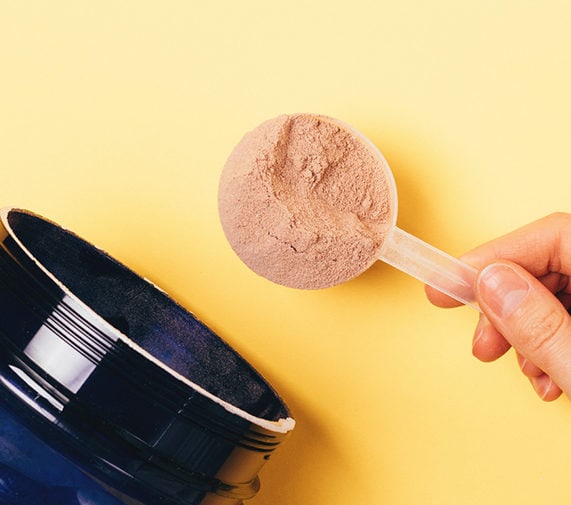Figuring out what to mix and how.
Protein powder has long been the the rage among body builders and keto-loving CrossFitters as well as the yoga-pants-wearing, Goop-reading, superfood-junkie Moon Juice set. But now regular Americans, not as bowled over by breakfast cereal as we used to be, are increasingly opting for higher protein fare such as protein bars and smoothies instead.
According to research firm ISBS World, cereal consumption was down 17% in 2016 from just a few years prior, and the downward trend continues. But all protein powders aren’t created equal. Dr. Zhaoping Li, professor of medicine and chief of the Division of Clinical Nutrition at UCLA, also specializes in weight management. She shares the skinny on protein powder’s benefits.
When it comes to deciding which protein powder to purchase, the fewer artificial ingredients like fillers and artificial sweeteners, the better, says Dr. Li. But there are many other considerations. Health-conscious emporiums such as Whole Foods and Thrive.com offer a myriad of options: whey, collagen, grass-fed, keto, bone broth protein powder, vegan varieties ala pea, soy and more—it’s confusing! “The benefits of protein powder differ depending on the type of protein,” says Dr. Li. But beware—don’t try to live on protein powders alone without medical supervision—you may be missing out on other essential ingredients necessary for survival.
Let’s break it down:
Whey
Whey protein (and its cousin, casein) is the watery part of the milk, a byproduct of the cheese-making process with a similar composition to human breast milk. Whey is a complete protein, with all of the building blocks [all nine essential amino acids] for your body’s protein needs to help build muscle.
When it goes through another filtering process, it loses and carbohydrates—and also some of its nutrients. It’s friendlier to the lactose intolerant, but often less creamier in a smoothie.
Collagen
Collagen is not a complete protein, and gulp, gross-out alert—may come from the skin, cartilage and also hair of animals. Bone broth protein powder is in the collagen category.
Dr. Li says to watch out for claims that collagen protein powder can enhance your cartilage, keep your skin young and help find this your arthritis. “None of that is firmly supported by scientific evidence.”
Plant-based protein powder
You’ll see a whole new crop of protein powders from pea, brown rice and hemp, but Dr. Li says soy is the only complete protein. They’re all fine if you want to use it as one meal replacement for weight loss, look to make up missing nutrients in the rest of your food and talk to your doctor about how many and what kinds are safe.
The Recommended Dietary Allowance for protein for the average nonathlete is 0.8 grams of protein per kilogram of body weight.
Beyond Smoothies
You don’t have to just drink your protein powder, you can also mix up your routine with healthy recipes. Add protein powder to oatmeal and overnight oats, muffins, pancakes, baked goods, energy bites, ice cream—even pasta, veggie burgers and soup.
Protein powder is quick and easy to use, can help build muscle, aid weight loss and satiate hunger—but check the nutritional label to make sure the formulation doesn’t have high levels of fat and sugar that will undo all your hard work. And Dr. Li warns: “If you snack when you’re not hungry it doesn’t matter if it’s a good protein or bad protein. If you want to lose weight, consuming extra calories defeats the purpose.” Choose wisely, though, and you’ve got a not-so-guilty pleasure.
twistup
Love OrangeTwist?
Join our twistup membership and receive a $100 gift card today!




